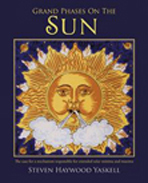"But still, the greatest challenge we have facing this is that the Sun is less linear (very much more non-linear) than many wish to think."

 |
Grand Phases on the Sun by Steven Haywood Yaskell Trafford Publishing
book review by John E. Roper
The world may seem to always be in a state of continual change, but there are still a few constants. For example, since its beginnings life on Planet Earth has always felt the warmth of the Sun. And while humanity's perception of it may shift over time, most people see our closest star as basically unchanging. Science has proven otherwise. In fact, our sun does change, and exploring not only how and why it may fluctuate in certain ways but also what effects these changes may have on our planet comprise a major part of the author's latest book. Yaskell doesn't claim to have written the definitive guide to Sol, but he does manage to do a great job of giving an overview of much of the historical and more modern research on the subject while offering several insightful observations of his own.
One of the more interesting aspects of Yaskell's book is his examination of not just the theories of scientific luminaries such as Kelvin, Newton, and Maunder but also his periodic insights into them as people. His lifting of the curtain on their occasional foibles, blind spots, and preconceived notions helps readers understand more clearly why some discoveries took longer and why solid research sometimes seemed to veer off on rabbit trails. Equally interesting are his observations on how the Sun's changes could have altered civilization over the centuries.
While his book is highly informative, Yaskell points out early on that it was never meant to be entertaining or even, in his own words, "an easy book to read." For those who already have a solid background in the sciences and their related jargon, though, this treatise on the Sun's phases is engaging.